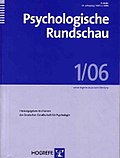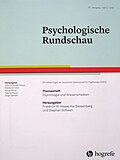Psychological review
| Psychological review | |
|---|---|

|
|
| description | Trade journal |
| Area of Expertise | psychology |
| language | German |
| publishing company | Hogrefe Verlag ( Germany ) |
| Headquarters | Göttingen , Bern a . a. |
| First edition | October 1, 1949 |
| founder | Gustav von Allesch |
| Frequency of publication | quarterly |
| Impact Factor | 1.107 (2015) [1] |
| editor | Christoph Klauer |
| Web link | Homepage at the publisher |
| Article archive | econtent.hogrefe.com |
| ISSN (print) | 0033-3042 |
| ISSN (online) | 2190-6238 |
The Psychologische Rundschau is a scientific journal with a focus on interdisciplinary psychology . It was one of the first professional journals for psychology in Germany to appear after 1945 (or to appear again) and has been the official organ of the German Society for Psychology (DGPs) since it was re-established after 1945.
content
Theoretical and methodological developments in the field of psychology are explained in the Psychological Review. The focus is on work that reflects general theoretical and methodological points of view and also represents provocative positions.
There is also a discussion of new ideas in the journal. In addition, the integration of basic research and application is a central goal of the journal. A report section deals with current professional and scientific policy issues. In addition to the scientific information, the Psychological Rundschau as the news organ of the German Society for Psychology and the Professional Association of German Psychologists also publishes news and dates from these professional associations. Reviews of psychological tests based on the TBS-TK system are also published.
history
The Psychological Rundschau has been published quarterly by Hogrefe Verlag (Göttingen) since 1949 . In 1949 the German Society for Psychology was re-established in the western zones of Germany and the magazine was founded as its organ. Carl Jürgen Hogrefe was involved as a university assistant in the preparation of the first post-war congress in Göttingen in 1948 and there was a need for a publication organ. The risk was too high for the publishers in question, the publisher of the former organ of the society, the Zeitschrift für Psychologie, was located in the eastern zone of Germany and therefore Hogrefe himself became the first editor and publisher. The first editor was Gustav von Allesch , at whose chair Hogrefe was employed. From this activity, too, Hogrefe later founded the Hogrefe Verlag. The journal Psychological Research appeared again in May 1949.
reception
In 2012, the Psychological Rundschau had an impact factor of 0.733 and was therefore ranked 82nd out of 126 journals in the Social Sciences Citation Index in the category of multidisciplinary psychology.
The journal is in the databases Social Science Citation Index (SSCI), Research Alert, Current Contents / Social & Behavioral Sciences, Social Sci Search, PsycINFO, PsycLit, PsyJOURNALS, PSYNDEX, Scopus, IBZ, IBR and Europ. Reference List for the Humanities (ERIH) listed.
Front pages
Over the years the appearance has been changed several times. The last four title pages can be seen here.
- Title pages of the Psychological Rundschau
Individual evidence
- ↑ TBS-TK at zpid.de ( Memento of the original from January 12, 2017 in the Internet Archive ) Info: The archive link has been inserted automatically and has not yet been checked. Please check the original and archive link according to the instructions and then remove this notice.
- ↑ Gisela Hogrefe (Ed.): 50 Years in the Service of Psychology 1949-1999 . Hogrefe Verlag, Göttingen 1999, ISBN 3-8017-1345-8 ., See also history on hogrefe.de ( memento of the original from January 9, 2017 in the Internet Archive ) Info: The archive link was inserted automatically and has not yet been checked. Please check the original and archive link according to the instructions and then remove this notice.
- ^ The first journal after World War II was Psychological Research - May 15, 1949
- ^ ISI Web of Knowledge, Journal Citations Reports Social Science Edition, 2012.



